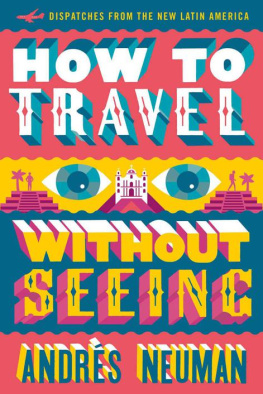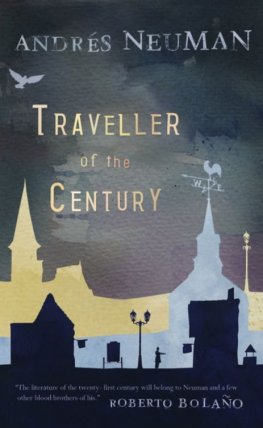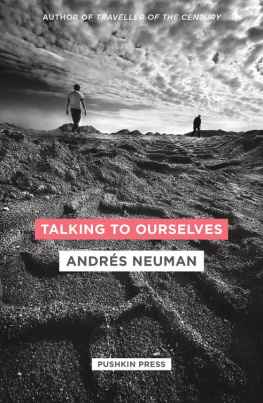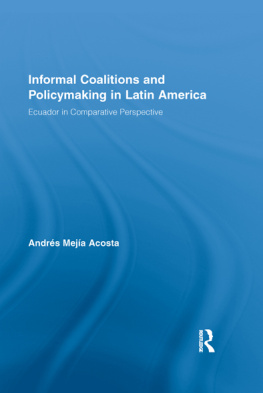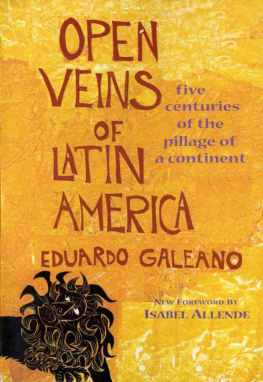Andres Neuman - How to Travel without Seeing: Dispatches from the New Latin America
Here you can read online Andres Neuman - How to Travel without Seeing: Dispatches from the New Latin America full text of the book (entire story) in english for free. Download pdf and epub, get meaning, cover and reviews about this ebook. year: 2016, publisher: Restless Books, genre: Detective and thriller. Description of the work, (preface) as well as reviews are available. Best literature library LitArk.com created for fans of good reading and offers a wide selection of genres:
Romance novel
Science fiction
Adventure
Detective
Science
History
Home and family
Prose
Art
Politics
Computer
Non-fiction
Religion
Business
Children
Humor
Choose a favorite category and find really read worthwhile books. Enjoy immersion in the world of imagination, feel the emotions of the characters or learn something new for yourself, make an fascinating discovery.
- Book:How to Travel without Seeing: Dispatches from the New Latin America
- Author:
- Publisher:Restless Books
- Genre:
- Year:2016
- Rating:3 / 5
- Favourites:Add to favourites
- Your mark:
- 60
- 1
- 2
- 3
- 4
- 5
How to Travel without Seeing: Dispatches from the New Latin America: summary, description and annotation
We offer to read an annotation, description, summary or preface (depends on what the author of the book "How to Travel without Seeing: Dispatches from the New Latin America" wrote himself). If you haven't found the necessary information about the book — write in the comments, we will try to find it.
How to Travel without Seeing: Dispatches from the New Latin America — read online for free the complete book (whole text) full work
Below is the text of the book, divided by pages. System saving the place of the last page read, allows you to conveniently read the book "How to Travel without Seeing: Dispatches from the New Latin America" online for free, without having to search again every time where you left off. Put a bookmark, and you can go to the page where you finished reading at any time.
Font size:
Interval:
Bookmark:

To the photographer Daniel Mordzinski, observer express.
To all of the friends who appear,
in camouflage, throughout this journey.
Standing on this hill with no view of the sea,
I look for that very reason to the sea.
Santiago Sylvester
Ive always had a knack for forgetting, to which I later added a knack for walking.
Joan Brossa
When the publishing house Alfaguara sent me the exhaustive itinerary of the book tour for their annual novel prize, I was sorry I wouldnt have more time to spend in each place. But then I thought, isnt that the point? Arent I going to experience, without even planning it, the very essence of contemporary tourism?
*
The idea was to take notes literally on the fly. If I was going to travel by air, I would write that way, too. If I was going to spend months in airports, hotels, and way stations, the truly aesthetic thing would be to accept this situation and search for its literary side. Not to force my writing but to adapt to the times and the timetables. That way the form of the journey would be the same as the form of the journal.
*
Before I write a book, I think more about tone than about plot, listening for the books eventual cadence. In this case I began to imagine a restless journal, told from a tight point of view and made up of a series of compact entries. One observation for each situation. One paragraph for each observation. There would never be a change of topic within a single entry. There would be no pauses. We no longer travel like that. We no longer see that way.
*
Rather than an in-depth report, I was interested in writing a cross between flash fiction, aphorism, and very short-form journalism. I would pass up the desire to recreate totalities or to give the impression of a whole. I would embrace the fragments. I would accept that traveling means, more than anything else, not seeing. The only thing we have is a glimmer of attention. Our small corner of happening. We wager everything, our poor knowledge of the world, in the blink of an eye. That was the interval that I chose, or that chose me, for this journey. Thats why I decided that instead of taking brief notes to develop later at home, I would finish each note here and now and register discrete moments. Writing as a method of capture. A need to trap small realities on the go and interpret them in real time. Like a net that seeks to fish its own waters.
*
Of course, not having time to go into depth is a limitation for any observer. But what if that speed, that very same lightness, were also an advantage? When an exhaustive and well-documented record of a place isnt feasible, we need to rely on the poetry of the immediate, to look with the radical astonishment of the first time. With a certain degree of ignorance and thus with a certain initial hunger.
*
These days we go places without moving. Sedentary nomads, we can learn about a place and travel there in an instant. Nevertheless, or perhaps consequently, we stay at home, rooted in front of the screen. Travel in our global age is as contradictory as globalization itself. While the latter produces a tension between universal convergence and local difference, contemporary travel oscillates between the apparent pointlessness of geographical movement and the changing reality in each successive area. We always live in several places at once. Wherever we are, we can check our email and messages, read newspapers from around the world, follow international events. Wherever we go, we remain within the same landscape: the landscape of communications. Thats why it seemed appealing to try writing a journal that would reflect two contradictory convictions. First, that we end up experiencing a particular world in every place we visit. Second, that through the media we spend more time in other places (or in several places simultaneously, or nowhere at all) than where we are physically. But if this is the case, then why does travel continue to transform us and teach us so much? That great I dont know is the subject of this book.
*
I didnt for a second want this journal to devolve into a social chronicle of the literary profession, to my mind one of the most self-absorbed and boring genres in existence. I didnt want to talk about the book tour, my novel, my personal relationships. I wanted to transcend them, to filter them through the landscape, to stretch their horizons. I only wanted to write about what I saw, heard, understood, or misinterpreted as I made my way through the labyrinth we call Latin America.
*
These days we travel without seeing anything. Thats the thought that came to mind when I learned of my dizzying itinerary. The tour would be an experiment, an exaggeration of our almost empty nomadism. And on the other side of the almost? What would I find? What do we see when we barely see at all? What follows is my account of what I barely saw from one end of the continent to the other. An assembly of vertigos, countries, readings, glances on the fly. Latin America in transit. Are you on board?
A day before traveling to the real Argentina, the geographic one, I run into the invisible Argentina. At the Madrid Book Fair I meet six or seven young people with strange accents, hybrid speech. We chat for a bit. They tell me stories like my own. Listening to them, I think about the absurdity of dividing people from the same country into those living inside and outside of it. Amphibians like these kids exist and they dont detract anything from the map of their country of origin. In fact they stretch it, transplant it. We say goodbye with a strange foreign familiarity. I see them leaving one by one, children and grandchildren and great-grandchildren of Argentineans, walking slowly, both lost and finding themselves, imperfectly Spanish and incompletely Argentine, patriots of the vicissitudes of life, there in the middle of the Parque del Retiro, right at the center of nowhere.
*
An expression we often use at the airport perfectly describes the experience of migration: to be in transit. Thats both how and what we are when we travel. Beings in transit. Just before embarking on a trip our sedentary side clings to stillness while our nomadic side yearns to roam. The collision of these two forces produces a sense of confusion. A certain split in our presence. Thats why I revere the airport, that aseptic cathedral where passengers begin the liturgy of changing states before actually changing places. Airports are the only temples weve been able to build to the present. True shrines to terrestrial transit.
*
Im fascinated by the introspective aspect of these constructions; they are speed merged with stillness, fortresses merged with air. Inside, our hasty lives confront an inevitable contradiction. We come to go somewhere, but we barely take a step. We want to get away, but the rhythm of the structure, its time frame and its protocols, forces us to wait. We embody that coerced patience, that urgent future that seems so distant.
*
Saying goodbye is a way of rehearsing death, but also a kind of resurrection. Airport goodbyes are both unnerving and liberating. We leave everything behind to board where everything is possible.
*
The boarding area at the Mlaga airport. A flock of birds has nested in the beams and keeps crisscrossing the roof. I watch their flight from this side of the window, while on the other side the airplanes take off. These birds are like the passengers who look at them: they fly within a tiny world. Their home is the border between departure and arrival.
Font size:
Interval:
Bookmark:
Similar books «How to Travel without Seeing: Dispatches from the New Latin America»
Look at similar books to How to Travel without Seeing: Dispatches from the New Latin America. We have selected literature similar in name and meaning in the hope of providing readers with more options to find new, interesting, not yet read works.
Discussion, reviews of the book How to Travel without Seeing: Dispatches from the New Latin America and just readers' own opinions. Leave your comments, write what you think about the work, its meaning or the main characters. Specify what exactly you liked and what you didn't like, and why you think so.

